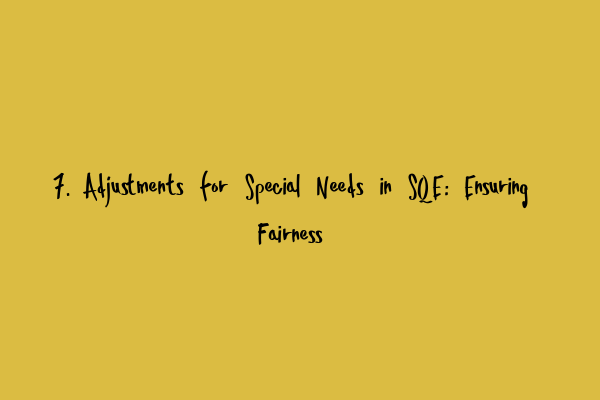7. Adjustments for Special Needs in SQE: Ensuring Fairness
Welcome to SQE Exam Law! In this blog post, we will be discussing the topic of adjustments for special needs in the Solicitors Qualifying Examination (SQE) and the importance of ensuring fairness for all candidates. The SQE is a rigorous examination that aims to assess the competence of aspiring solicitors, and it is crucial that the examination process provides equal opportunities for all candidates, including those with special needs.
Before we delve into the details, let’s first understand what the SQE is and why it is such a significant milestone for aspiring solicitors. The SQE is a series of exams that have replaced the previous route to qualification as a solicitor in England and Wales. It is designed to test candidates on their legal knowledge and skills, and upon successful completion, candidates will be eligible to undertake a two-year period of qualifying work experience, known as a training contract, before becoming fully qualified solicitors.
Now, let’s explore the topic of adjustments for special needs in the SQE. It is vital to recognize that individuals with disabilities or special needs may require certain accommodations to ensure they have an equal opportunity to demonstrate their knowledge and skills during the examination process. These adjustments can include, but are not limited to:
- Extra time: Some individuals may require additional time to complete the examination due to factors such as dyslexia, visual impairments, or other learning disabilities. Providing extra time can help level the playing field and allow these candidates to fully showcase their abilities.
- Alternative formats: Candidates with visual impairments may require examination materials to be provided in alternative formats, such as braille or large print. It is essential to ensure that these candidates have access to the examination content in a format that suits their needs.
- Assistive technology: The use of assistive technology, such as screen readers or speech recognition software, can greatly support candidates with special needs during the examination. It is crucial to make the necessary arrangements to provide access to such tools.
- Quiet or separate rooms: Some candidates may require a quiet or separate room to minimize distractions and create a comfortable environment for them to concentrate during the examination. Providing appropriate examination conditions is crucial to ensuring fairness.
- Additional resources: In certain cases, candidates may require additional resources, such as specific reference materials or specialized equipment, to facilitate their examination experience. It is important to consider these individual needs and provide the necessary resources.
- Accessible venues: Ensuring that examination venues are accessible to candidates with physical disabilities is essential. This includes providing ramps, elevators, and other facilities that enable easy access to the examination centers.
- Support from invigilators: Trained invigilators who are aware of the specific needs of candidates with disabilities or special needs can provide valuable support during the examination, including clarifying instructions, offering guidance, or assisting with any technical difficulties.
These adjustments for special needs are crucial in ensuring fairness and equal opportunities for all candidates. It is essential for the SQE examination process to be inclusive and accommodating, allowing every aspiring solicitor to showcase their abilities without being hindered by their special needs or disabilities.
At SQE Exam Law, we understand the significance of ensuring fairness in the SQE examination process. We believe that all candidates should have an equal opportunity to demonstrate their legal knowledge and skills. To learn more about related topics, we recommend checking out these articles:
- 24. Unlocking Knowledge with SQE Webinars: Expert Insights at Your Fingertips
- 17. Review of SQE Course Providers: Choosing the Best Fit
- 4. Unveiling the SRA Syllabus for the SQE
- 31. Conquer the SQE: Insider Tips and Study Tricks for Success
- Grading System in SQE: Understanding How Exams are Evaluated
We hope this article has shed light on the importance of adjustments for special needs in the SQE examination process. Ensuring fairness and equal opportunities for all candidates, regardless of their disabilities or special needs, is essential for a just and inclusive legal profession. If you have any questions or would like further information, please do not hesitate to reach out to us.
Thank you for reading!
